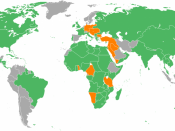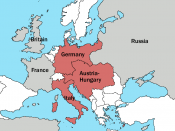British Foreign Policy 1878-1914 (a) Explain Briefly why Britain entered into an alliance with Japan in 1902.
Firstly, Britain held a policy of 'splendid isolation'. Their prime interest abroad was India, "The jewel in the crown". The route from Britain to India depended on a strong navy. Britain's navy was supreme and, with no rivals in Europe, Britain felt that there was no need to pay attention to European affairs. Joseph Chamberlain proclaimed: "If the worst comes to the worst, we could hold out, as our ancestors did, against the whole of them." Britain soon had many worries though. At this time Britain was not on friendly terms with Russia, France or Germany. She had growing apprehensions about an increasing Russian influence in the Far East, as well as the French advances in West Africa and the developing naval strength of Germany. However there was a widespread feeling of hostility toward Britain following the Boer War, and finding an ally proved difficult.
Japan though, seemed like an ideal ally for a number of reasons. Russian interference in northern China and her seizure of Port Arthur in 1887 seemed directed against Japan's influence in Korea. So, both Japan and Britain found common interest in containing Russia, as one of Britain's main concerns was the threat posed by French and Russian naval power in the Far East. Japan was strategically placed to ease the strain on the British Navy. Both Japan and Britain had considerable financial, political and industrial investments in China too.
This was a significant treaty as it demonstrated Britain's departure from her long held policy of splendid isolation from international treaties. As a result of the Anglo-Japanese alliance, China suffered economically and also lost territory to Japan. They also became very cautious of both Japan and Britain and signed an agreement with Germany to feel more secure.
(b) To what extent was the system of alliances and ententes responsible for Britain entering the First World War? To say that the outbreak of World War I was entirely due to the Entente and Alliance systems would be harsh. There were undoubtedly other factors which added to the likeliness of war.
The Entente system consisted of Great Britain, France and Russia. Britain and France put their differences aside, and Russia, an ally of France and a potential enemy of Britain, helped to bind the countries together. The Entente was consolidated through each countries opposition to Germany. The Triple Entente was only an informal grouping when first formed, but between 1912 and 1914, it became an effective diplomatic combination. Effectively though, Britain's only ally was Japan because the Entente was only an 'agreement' and held no obligation. In this respect, Britain were still retaining a little of their isolationism.
The Triple Alliance was formed between Germany, Austria and Italy in 1882. It was initially a pact to offset the power of Russia and France. In the end, the failure of Italy to stand by this alliance, leading to her eventual declaration of war on Austria on 23rd May 1915, was a significant factor in the eventual victory of England and France in 1918.
There was inevitably a huge rivalry between the two systems, and a great amount of this rivalry was founded on paranoia and misconception. Geographically, it is easy to see why the Triple Alliance may have become paranoid. The Triple Entente surrounded the Alliance. In the event of war, this would leave Germany fighting a war on two fronts, almost a tactical impossibility.
On a personal level, I believe that the alliances were practically a bad idea. Each one based their strategy on the occurrence of invasion by the other. Both systems took a purely defensive role and canceled each other out, so to speak.
However, it could also be argued that Germany were the keenest of any of any country in Europe to go to war. She felt that she had had much to prove, and was the strongest country in Europe in many senses. She had the largest industry and therefore could produce masses of military equipment and ammunitions. Her navy was developing rapidly too.
Britain entered the war due to a series of complex events. Some of these events were external to the Entente and Alliance systems. So it would seem that the systems weren't entirely responsible for Britain's entering the war.
The first event in the sequence leading to the outbreak of war was the assassination of Arch-Duke Franz Ferdinand. Gavrilo Princip, an 18 year old member of the "Black Hand" terrorist movement of Serbia, shot the Arch-Duke from point blank range. Austria Hungary then created an ultimatum with 10 requested points. The Serbs agreed to 9 of the points but Austria refused and declared war on Serbia. They believed that the government paid for the assassination but had no evidence.
This was, in my view, was an act of carelessness, and ultimately it led to the outbreak of World War I. The declaration of war on Serbia brought in a fellow Slav country, Russia. Russia didn't declare war on Austria-Hungary as such, they made preparations by mobilizing their troops. Germany though, saw this as an offensive act, and declared war on Russia. To avoid a war on two fronts, Germany attacked quickly through Belgium and into Northern France.
Britain were now left facing a difficult dilemma. They had signed a treaty with Belgium in the early 19th century and were obliged to protect Belgium's neutrality. It was a matter of pride, and Britain declared war on Germany. By August 1918 all the countries from opposite alliances were facing each other in war, except Italy.
In conclusion, I believe that the Triple Entente and the Triple Alliance systems were partly responsible for Britain entering the war. However, They were not the only reasons. As we have seen, there were external factors which led to the outbreak of war. Ultimately, Britain were faced with a difficult situation and could not avoid going to war.





